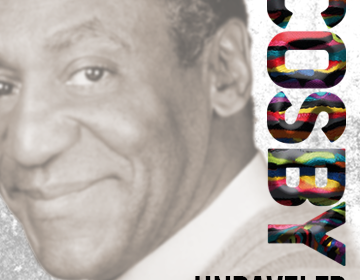With #MeToo’s critics growing, will backlash against movement help Cosby’s defense?
Some #MeToo fatigue showed up during last week’s four-day jury selection for the entertaimers.

Participants march against sexual assault and harassment at the #MeToo March in the Hollywood section of Los Angeles on Sunday, Nov. 12, 2017. (Damian Dovarganes/AP Photo)
To a casual observer, it might seem like Bill Cosby is a doomed man.
Sure, he beat his sexual assault case once already, when a jury last year deadlocked after five days of deliberations.
But this is the #MeToo era, when everyone finally seems to understand that sexual misconduct is an experience most women have endured while the world looked the other way.
The judge is allowing five more accusers to testify against the 80-year-old entertainer this month in his retrial, a victory for prosecutors who aim to show that Cosby’s alleged assault of Andrea Constand was part of a decades-long pattern of perversion.
What’s more, April is Sexual Assault Awareness Month. Anyone who forgets that fact need only buy a cup of coffee — complete with coffee sleeve urging drinkers to “BELIEVE AND SUPPORT SURVIVORS” — at the deli next door to the Montgomery County Courthouse, where the retrial begins today. The Pennsylvania Coalition Against Rape distributed the coffee sleeves in Norristown — and across the state.

Still, while experts agree the #MeToo climate might benefit prosecutors, others wonder whether the defense team will be just as likely to use it to help keep Cosby out of jail.
After all, there’s a burgeoning backlash against the movement, just six months after it first gained national traction.
I’m slightly pleased someone has spoken out against METOO it’s ethos is profound but it’s become a bra burning bandwagon for justice. Maybe the strongest way to fight abuse is to succeed in life, hold your head high not rekindling it in a woman’s army.
— Ariadne Obscura (@AriadneObscura) March 17, 2018
Partisan split emerges
A new Bucknell University study shows that most Americans remain deeply divided on it. Forty percent of those surveyed say they felt the movement has gone too far, and 70 percent worry that it might lead to the unfair punishment of men.
While I’m at it, This #metoo movement is getting out of control. I was a secretary for 20 odd years and I never had an issue with any form of sexual harassment. I am not denying that it happens, but I think some people are just “jumping on the bandwagon”!
— Pamela Bates-Hale (@pahale99) March 24, 2018
Researchers surveyed more than 1,100 representative Americans during the last week of March.
“There are lots of people who do view #MeToo as piling on or as going too far or as overreaching,” said Chris Ellis, associate professor of political science and director of the Bucknell Survey Research Laboratory.
Ellis found a partisan split in respondents’ answers, with Democrats of both genders two to three times as likely to view the movement favorably than their Republican counterparts.
The #MeToo movement and its backlash complicate things for attorneys on both sides of the courtroom, where political party wasn’t one of the details debated during jury selection.
“What it will certainly do is make the case be argued within this backdrop, within this idea that we’re now paying attention to things that have been swept under the rug for 30 or 40 years. So that certainly helps the prosecution,” Ellis said. But “we’re also starting to see a backlash, particularly on the right, of people who are concerned that one of the main effects of this movement is to punish people for things they didn’t do.”
Indeed, such #MeToo fatigue showed up during last week’s four-day jury selection.
Judge Steven O’Neill asked all the potential jurors if they were aware of the #MeToo movement — and if what they knew would color their judgment. One middle-aged white man responded that he felt many women were “jumping on the bandwagon.” That ignited a fight between prosecutors, who moved to strike him, and defense attorneys, who wanted to keep him. O’Neill ended up excusing the man from service.
Alan Tuerkheimer, a Chicago-based jury consultant who has followed the Cosby case, said he expects both sides will use #MeToo in different ways.
The prosecution “wants to ride the wave and say, ‘Hey, this is serious, now is our time, this has been going on for a long time, but you shouldn’t tolerate it as jurors.’ They’re going to want to empower the jurors to make a statement (against sexual misconduct) and find him guilty,” Tuerkheimer said.
“The defense is going to want to (amplify) the people saying: ‘All right, this has been going on enough, we get it!’ There’s this kind of fatigue going on, like the one (potential) juror who said, ‘She’s jumping on the bandwagon, and she’s just taking advantage of the environment to bring this claim!’ ”
‘We haven’t made a dent in the problem’
Still, one expert warned against drawing too many conclusions from the Bucknell study.
It merely reinforces the notion that long-entrenched misogyny persists when it comes to people doubting women’s sexual misconduct claims, said Kristen Houser, a spokeswoman for the Pennsylvania Coalition Against Rape.
“The fact that we even have a survey saying that five months of conversation has ‘gone too far’ is an indicator to me that we haven’t made a heck of a lot of dent in the problem in the first place,” Houser said. But “the #MeToo movement is only five or six months old, whereas rampant sexual violence, misconduct and harassment against women is more than 2,000 years old.
“So I always like to keep in mind this context that we’re not going to undo culturally ingrained, normalized behaviors by talking about it for six months.”
Ladies, only your discernment will keep you from jumping on the bandwagon of a demonic movement that minimizes and disrespects the very men you say you love. #TheFutureisMaleANDFemale #TheFutureIsFemale #MeToo #TimesUp #Balance #JointDominion
— Desirée M. Mondesir (@DesireeMondesir) March 9, 2018
As for the Cosby jury, she said: “It could go either way, about whether or not these 12 people are noticing that every single person that is talking about the #MeToo movement is telling similar stories about very common experiences, the normal, common response of not wanting to talk about it and not making formal reports, and discussing how the fear of harassment and misconduct limits behavior.
“So you may have people (jurors) who recognize that,” she said. “Or you may have people who still insist on wanting to deny what has now been supported by research for 25 years — and now by these social movements. We’re now seeing the same information given from thousands of people all over the country.”
WHYY is your source for fact-based, in-depth journalism and information. As a nonprofit organization, we rely on financial support from readers like you. Please give today.





